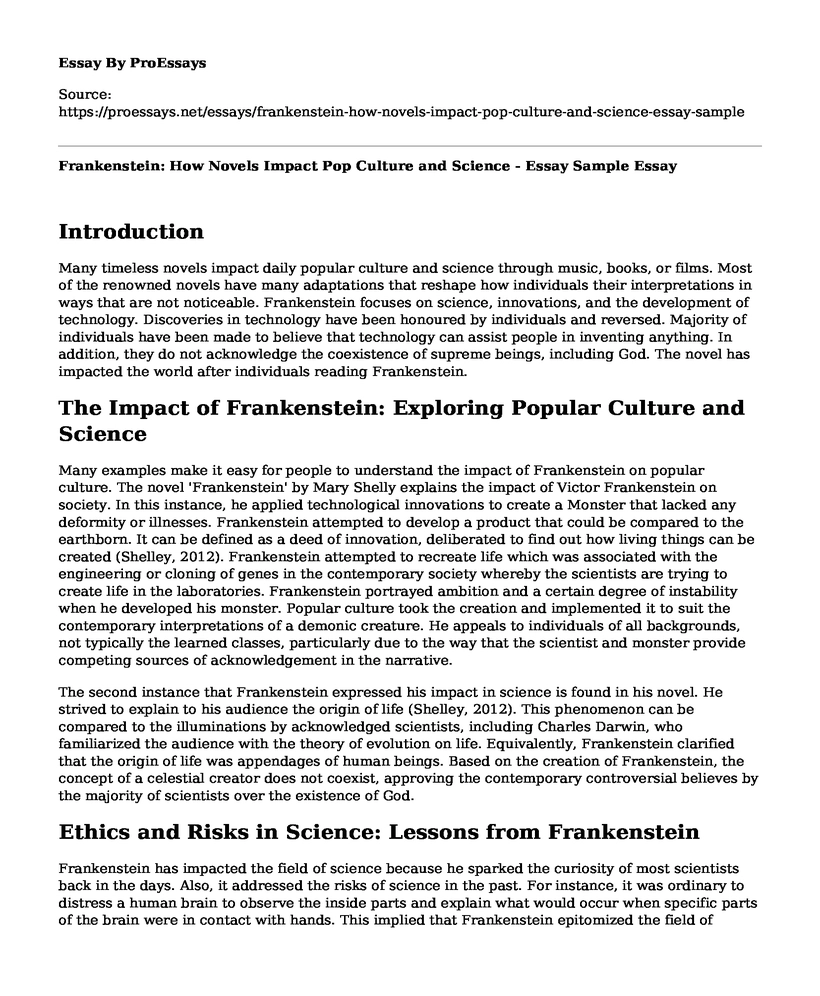Introduction
Many timeless novels impact daily popular culture and science through music, books, or films. Most of the renowned novels have many adaptations that reshape how individuals their interpretations in ways that are not noticeable. Frankenstein focuses on science, innovations, and the development of technology. Discoveries in technology have been honoured by individuals and reversed. Majority of individuals have been made to believe that technology can assist people in inventing anything. In addition, they do not acknowledge the coexistence of supreme beings, including God. The novel has impacted the world after individuals reading Frankenstein.
The Impact of Frankenstein: Exploring Popular Culture and Science
Many examples make it easy for people to understand the impact of Frankenstein on popular culture. The novel 'Frankenstein' by Mary Shelly explains the impact of Victor Frankenstein on society. In this instance, he applied technological innovations to create a Monster that lacked any deformity or illnesses. Frankenstein attempted to develop a product that could be compared to the earthborn. It can be defined as a deed of innovation, deliberated to find out how living things can be created (Shelley, 2012). Frankenstein attempted to recreate life which was associated with the engineering or cloning of genes in the contemporary society whereby the scientists are trying to create life in the laboratories. Frankenstein portrayed ambition and a certain degree of instability when he developed his monster. Popular culture took the creation and implemented it to suit the contemporary interpretations of a demonic creature. He appeals to individuals of all backgrounds, not typically the learned classes, particularly due to the way that the scientist and monster provide competing sources of acknowledgement in the narrative.
The second instance that Frankenstein expressed his impact in science is found in his novel. He strived to explain to his audience the origin of life (Shelley, 2012). This phenomenon can be compared to the illuminations by acknowledged scientists, including Charles Darwin, who familiarized the audience with the theory of evolution on life. Equivalently, Frankenstein clarified that the origin of life was appendages of human beings. Based on the creation of Frankenstein, the concept of a celestial creator does not coexist, approving the contemporary controversial believes by the majority of scientists over the existence of God.
Ethics and Risks in Science: Lessons from Frankenstein
Frankenstein has impacted the field of science because he sparked the curiosity of most scientists back in the days. Also, it addressed the risks of science in the past. For instance, it was ordinary to distress a human brain to observe the inside parts and explain what would occur when specific parts of the brain were in contact with hands. This implied that Frankenstein epitomized the field of science before and after those moments. It epitomized the risks of science and scientists who lacked ethics in using human life for experiments. The novel highlights the number of times to find out something to break boundaries. Mary Shelley was capable of conveying the message that science was required to answer some of the most unanswered questions. Ultimately, Frankenstein was able to find out that electricity does begin life.
Conclusion
Frankenstein has influenced the world in the field of popular culture and science. It has revolutionized media, science, and holidays. However, its message and the treasured characters will live through popular culture. Science has been instrumental in this because it did elicit curiosity among the scientists and addressed the risks of looking for answers. The literature students should be encouraged to read the novel because it would impact them positively.
References
Shelley, M. (2012). Frankenstein (3rd ed.). Ontario, Canada: Broadview Press.
Cite this page
Frankenstein: How Novels Impact Pop Culture and Science - Essay Sample. (2023, Apr 12). Retrieved from https://proessays.net/essays/frankenstein-how-novels-impact-pop-culture-and-science-essay-sample
If you are the original author of this essay and no longer wish to have it published on the ProEssays website, please click below to request its removal:
- Odysseus Weeping - Essay Example
- Literary Analysis Essay on Twain Adventures of Huckleberry Finn: Huck Finn and Jim's Relationship
- Essay Sample on George Orwell's Position on Imperialism
- Kollontai's 'Sisters' - Literature Analysis Essay
- The Dangers of Being Judgmental - Literature Essay Example
- Essay Example on the Power of Metaphor in Shakespeare's Midsummer Night's Dream
- Paper Example on Living in Between: Lahiri's Struggle to Balance Indian & American Identities







